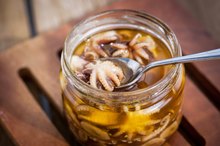Soybean Oil Nutrition Facts
Soybean oil is a type of vegetable oil that is extracted from whole soybeans 1. This cholesterol-free oil is high in a type of unsaturated fat known as polyunsaturated fat. Because soybean oil is inexpensive, it is used extensively in food products in the United States, particularly for manufacturing margarines and shortenings.
Tips
Soybean Oil has 857 Calories and 100.00 g of Total lipid (fat) per 100 gram serving according to the nutrition facts provided by the USDA Food Composition Database.
Basic Nutrient Values
One tablespoon of soybean oil contains approximately 103 calories and 14 g total fat, 2 g of which are saturated fat. Because soybean oil is 100 percent fat, it does not contain protein or carbohydrates and is sodium-free. Soybean oil is composed of approximately 58 percent polyunsaturated fat, 23 percent monounsaturated fat, and 15 percent saturated fat.
Vitamin Content
Does Olive Oil Contain Vitamin E?
Learn More
Soybean oil is a food source of several vitamins, including vitamin E, vitamin K and choline, a B-vitamin that your body makes but that you also need to obtain through your diet. One tablespoon of soybean oil contains 1.1 mg of vitamin E, meeting 6 percent of the Recommended Daily Value (DV) and 24.8 micrograms or mcg of vitamin K, meeting 31 percent of the DV. The same amount provides 43.7 mg of choline or 8 percent of the Recommended Adequate Intake, or AI level.
Vitamin Functions
The vitamins in soybean oil perform many functions. Vitamin E is an antioxidant nutrient that helps protect body cells and fight heart disease and is important for proper nervous system function and protection. It also supports healthy skin. Vitamin K is necessary for normal blood clotting and plays an important role in regulating blood calcium levels and bone formation. Choline, according to the U.S. Department of Agriculture Agricultural Research Service, plays an important role in cell membrane structure and is needed for the synthesis of the brain chemical, or neurotransmitter, acetylcholine 23.
- The vitamins in soybean oil perform many functions.
- Vitamin K is necessary for normal blood clotting and plays an important role in regulating blood calcium levels and bone formation.
Health Benefits
What Vitamins Do Mangoes Have?
Learn More
Soybean oil a good choice because it is low in saturated fat but high in polyunsaturated fats. Saturated fat elevates cholesterol levels and may contribute to heart disease. According to the American Heart Association, polyunsaturated fats, when used to replace saturated or trans fats and consumed in moderation, may have a beneficial effect on your health. This type of unsaturated fat helps reduce blood cholesterol levels; lowering your risk of heart disease. Polyunsaturated fats also include the essential fatty acids, omega-6 and omega-3, that you must obtain through diet. These fatty acids are crucial for normal growth, development and brain function.
- Soybean oil a good choice because it is low in saturated fat but high in polyunsaturated fats.
- According to the American Heart Association, polyunsaturated fats, when used to replace saturated or trans fats and consumed in moderation, may have a beneficial effect on your health.
Warning
All fats, including unsaturated fats, should be consumed in moderation. According to the U.S. Department of Agriculture's Dietary Guidelines for Americans, 35 percent or fewer of your total calories should come from fat 23. In addition, all fats are rich in calories, and choosing a diet too high in fat makes it more difficult to avoid consuming excess calories, which may lead to weight gain.
Related Articles
References
- Nutrition Data: Vegetable oil, soybean lecithin
- U.S. Department of Agriculture: Choline
- U.S. Department of Agriculture: Dietary Guidelines for Americans: Fats
- Omega-3 National Institutes of Health Office of Dietary Supplements. November 21, 2018
- American Heart Association. Polyunsaturated Fat. https://www.heart.org/en/healthy-living/healthy-eating/eat-smart/fats/polyunsaturated-fats
- American Heart Association. Saturated Fat. https://www.heart.org/en/healthy-living/healthy-eating/eat-smart/fats/saturated-fats
- Medline Plus. Facts About Polyunsaturated Fats. https://medlineplus.gov/ency/patientinstructions/000747.htm
- Patterson E, et al. Health implications of high dietary omega-6 polyunsaturated Fatty acids. J Nutr Metab. 2012;2012:539426. doi: 10.1155/2012/539426.
Resources
Writer Bio
Michele Turcotte is a registered, licensed dietitian, and a certified personal trainer with the National Academy of Sports Medicine. She has more than 12 years of experience in clinical and corporate settings, and has extensive experience in one-on-one diet counseling and meal planning. She has written freelance food and nutrition articles for Trouve Publishing Inc. since 2004.









